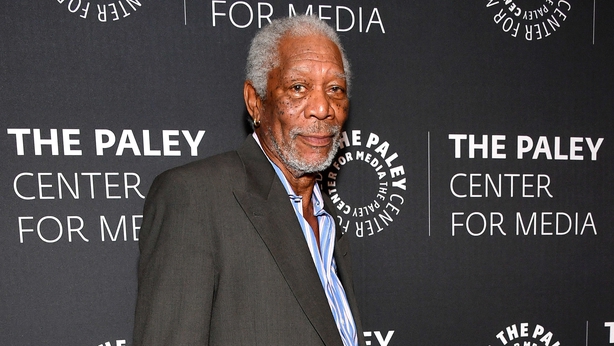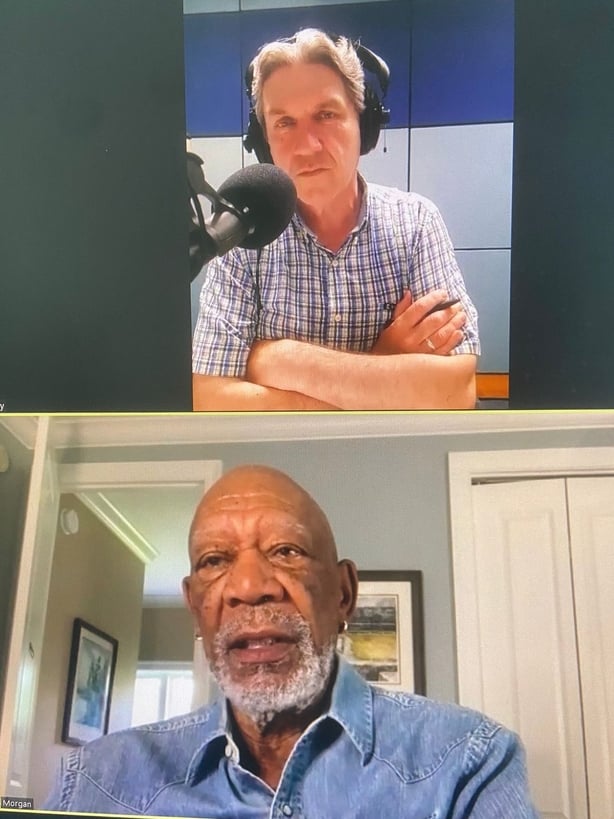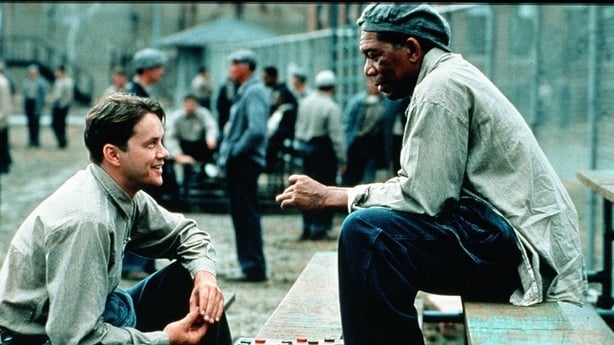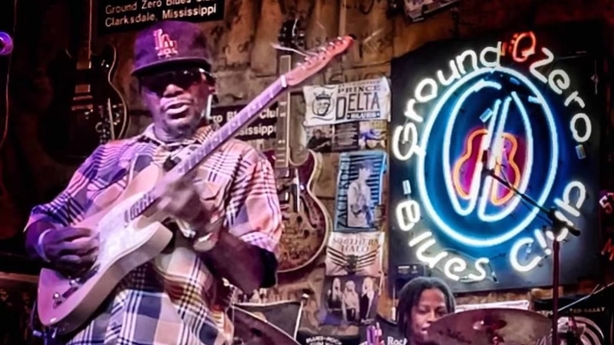Oscar-winning actor and filmmaker Morgan Freeman is bringing his love and passion for blues music to Ireland this June.
As part of The Delta Blues Project, Freeman will be the honorary MC to a unique collaboration between the RTÉ Concert Orchestra and jazz and blues impresario David O'Rourke.
Ahead of his appearance, the Academy-award winner talked to RTÉ Arena about his life in Mississippi, co-owning a world-famous blues bar, and about Robert Johnson’s famous deal with the devil.
The actor also shared how he refined his iconic voice, about preparing for iconic acting roles in The Shawshank Redemption and Invictus, and how a Best Actor award he won aged 12 is just as important as his illustrious Oscar... listen above.
The Mississippi Delta is the birthplace of blues music. And it is here where Morgan Freeman’s love and appreciation for music style began.
"My family history is rooted primarily in Mississippi. The two arms of my family are both rooted here," he says.
"One’s black, the other is white-based… My great-great-grandfather was white and married my great-great-grandmother, who was black, in Mississippi. These things did happen in the 1800s."

Freeman says that blend of white and black ancestry was very usual for the time. Although Mississippi was segregated in the 1930s, he had a good childhood, with great teachers and parenting, ‘everything a kid would need to grow up.’
It wasn’t until his early teenage years, however, when Freeman returned home to Mississippi from Chicago, that he got into blues music in a much bigger way. This was also when he found another "home" in acting. Speaking of this time, he says:
"When you find your niche in life, then there’s a kind of power that you feel, that you experience. This is where I am very comfortable and have no qualms about what I’m doing. I know what I’m doing. And that’s always my life."
Like his acting, did blues music give him a similar sense of home or belonging?
"Within music, yes. But my musical tastes were rather eclectic. The only music that I heard that I couldn’t quite get into was opera. But everything that stems from the blues, anything rock and roll, pop music, jazz, all have some connection to Delta Blues, believe it or not."
Growing up in Greenwood, Mississippi, Freeman has always had an undeniable connection to pioneering bluesman, Robert Johnson.
"This is a very unique combination that I guarantee you is going to just really dazzle the audience."
When asked about ‘that’ famous crossroads, where Johnson allegedly sold his soul to the devil for success, Eric Meler, co-owner of the Ground Zero Blues Club, adds that the connection couldn’t be closer.
"[That crossroad] is behind our club," Eric says. "It’s literally in the parking lot… When Morgan and Bill Luckett co-founded the club, I think it was just incredibly visionary to put it there."
While his world-famous blues club may be beside a piece of blues history, Freeman makes no qualms about the origins of that story. "That’s pure myth. I’m not one who believes in the devil, for one thing," he says.

"Blues is actually called the devil's music by the clergy. It isn’t. The blues is merely lament. [When someone’s] singing the blues, they’re singing about how sad they are that their woman left, or they’re on the streets, don’t have enough money, don’t have a job. That is all personal lament, for the most part."
Reflecting on the time, place, and success of Robert Johnson, does Freeman think blues music was subversive? To a point, yes. He says that if the person heard the lyrics and understood them, then the song is subversive. Otherwise, it’s "slight language."
"I’ll bet that you know the separation between the Irish and the English; the Irish had a 'conversational code’ they could use. The same thing [existed] in the South," he says.
Developing his signature voice
Upon mentioning the Irish, Arena host Seán Rocks brought the conversation to one of Freeman’s iconic roles, Red in The Shawshank Redemption, a role originally described in Stephen King’s novella as an Irishman.
On learning about that fact, Freeman admits he didn’t read the book but rather stuck to the script given to him. Has the script always been the starting, middle, and ending point for him as an actor?

"Absolutely, yes, all my life," he says.
"I got on the stage for the first time when I was 8 years old. It was like going back to the womb - right to where I belong. When I was 12 years old, we had these little talent contests of all kinds, with music, bands going against each other, we’d organise drama. And when I was 12 years old, I won my first ‘Best Actor award’ in Mississippi."
That very first award he won, Freeman says, is still up there on par with the Oscar he won for Million Dollar Baby.
On reflecting on his career, and although he enjoyed success on the stage at an early age, Freeman notes there wasn’t much comment about his signature voice until much later in his life, after his work on the children’s TV show The Electric Company.
"I said (to Mandela), 'If this comes to be, and I get to play you, I'm going to have to know you.’ So anytime we were in proximity, for years after that, we got together, and I would hold his hand."
"I went to college for about twenty minutes – figuratively speaking," he says.
"I was in the theatre department, and I studied voice development and voice diction. And I had a really terrific professor who knew how to put a voice on a person. And that’s where my voice began to be ‘my voice.’"
Before college, Morgan says that he had a deep Southern accent, which was modified and refined to give a more regional "actors voice." But accents are something that he still finds challenging.
"I know actors that can just do voices or accents," he says, "but I can’t – I have to listen to it, over and over. I did manage to come close to Nelson Mandela in the film Invictus. But that was serious study that got me there."
Nelson Mandela, Clint Eastwood, and ‘energy transference’
For his role in Invictus, how important was it to match Nelson Mandela's look, sound, and walk? Freeman explains that as soon as he was tied to the project, close access was instrumental to performing the role.
"What happened with Mandela was when he published (his autobiography) Long Walk to Freedom, he was asked by somebody in the press, 'If your book becomes a movie, who would you like to play you?’ He named me to do it."
The producer at the time, Anant Singh, then put the two men together. Freeman just so happened to be in South Africa at the time and went to meet Mandela at his home in Jo'burg.
"I said (to Mandela), ‘If this comes to be, and I get to play you, I’m going to have to know you.’ So anytime we were in proximity, for years after that, we got together, and I would hold his hand."
"That’s energy transference, for me, the actor. If you’re going to play someone, some real person, someone you can get close to – it’s best to touch them. It’s energy transference. I think that works very well."
On speaking of the director of Invictus, Clint Eastwood, Freeman refers to him as one of his favourite directors of all time:
"I think Clint is an actor’s director. He doesn’t direct actors. He directs movies. He hires actors, and it’s your job. And I love that about him that you establish your own character; you play it and do what the scene calls for. [He’ll] have the scene set up. Cameras will be where we want them to be. Lights will be where we want them to be. And go for it."
"He never says action, and he never says cut. He’s his own person on a movie set. Wonderful. I begged him to direct Invictus. It’s one of the few movies he directed that he wasn’t in."

Still got the blues
The conversation on an actor’s freedom ties nicely to The Delta Blues Project's Dublin collaboration with the RTÉ Concert Orchestra, for which Freeman will serve as an honorary MC. Eric Meler explains that "this is highly unique, to take Delta Blues songs and infuse them with orchestral sounds."
"We’re excited. This is going to bridge two generations, two styles of music. Keep in mind these blue artists don’t really have set lists. They play instinctively. So this is a very unique combination that I guarantee you is going to just really dazzle the audience."
The Delta Blues Project is on Sunday, June 11th, at O’Reilly Hall, UCD, Dublin - find out more here, and listen to more from RTÉ Arena here.


